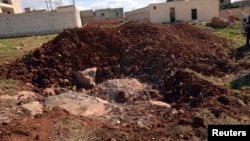U.N. General Assembly's Latest Syria Resolution
U.N. General Assembly's Latest Syria Resolution
-Adopted by vote of 107 to 12, with 59 abstentions
-Calls for rapid progress on a political transition
-Expresses outrage at 'rapidly increasing death toll'
-Condemns Syrian government's use of heavy weapons
-Condemns the widespread and systematic violations of human rights in Syria
-Requests international community provide urgent funds to help countries hosting displaced Syrians
-Calls for report on situation of internally displaced persons in Syria
Damascus is believed to have one of the world’s largest chemical weapons arsenals, including mustard gas, the more modern sarin and even VX - the most toxic of all chemical weapons.
Charles Duelfer, a former head of the Iraq Survey Group that investigated the extent of Iraq’s weapons of mass destruction, said Syria has about five or six key locations where the chemical weapons are stockpiled. But he notices a disturbing trend.
“As this war goes on, the control over these sites has dissipated and the evidence seems to be suggesting that some of the stockpiles have been moved around," he said. "That, of course, makes the potential for the dispersal of these agents into various hands more likely and more dangerous.”
Who has used chemical weapons in Syria?
Recently, there have been claims and counterclaims of chemical weapons use in Syria.
The Syrian government has accused opposition forces of using sarin. But several western countries, as well as Israel and Turkey, have charged that Syrian President Bashar al-Assad has used small amounts of chemical weapons against rebel forces.
That evidence, said Duelfer, essentially came from the examination of alleged victims of chemical weapons use.
“There have been a lot of people who have been brought to Turkey, that have been examined by doctors. Their symptoms parallel the symptoms of being exposed to a nerve agent," he said.
"To a lesser extent, I think there are samples, environmental samples - soil samples, agricultural samples - things like that,” said Duelfer. “However, one of the downsides, if it can be considered a downside of sarin, is that it tends to dissipate fairly quickly. And so over time, the confidence and the indisputable nature of the evidence can attenuate [weaken].”
The United States has taken a cautious approach, saying there must be a full investigation of chemical weapons use in Syria.
United Nations investigates
United Nations Secretary-General Ban Ki-moon has named Swedish scientist Ake Sellstrom to head an international team to do just that. Sellstrom is an experienced investigator, having worked at the U.N. special commission on Iraq.
However Duelfer said Sellstrom is hindered in his investigation because the Syrian government has, up to now, denied him full access anywhere in the country.
“I still feel very strongly that the United Nations should have a team on the ground," said Duelfer. "There ought to be some party with their major interest being the truth of the matter - none of the other parties have necessarily a strict interest in the truth.”
Duelfer said Sellstrom finds himself in a difficult situation.
“Like so many of these things, it’s at the intersection of physical science and political science. The physical scientist can get chewed up and spit out in the world of political science, where truth is quite a relative term,” said Duelfer. “So the credibility of his report and ability to perform will be determined by the access that the politicians will be able to negotiate for him. And the secretary-general. Ban Ki-moon, is going to have to be pretty firm with the [Syrian] government. Otherwise, a very limited inspection may be worse than no inspection at all.”
U.N. mandate limited
In addition, Duelfer said Sellstrom’s U.N. mandate does not include finding out “who” has used chemical weapons.
“It is a much more difficult, and also politically much more important question, to find out what was the return address on this. And that can be extremely difficult,” said Duelfer. “But as a technical expert, his goal, as given to him by the secretary-general, is simply to find out if these chemical agents have in fact been used.”
Sellstrom is currently gathering evidence on the use of chemical weapons in Syria outside that country, while he and his team wait for a possible green light from the Syrian government giving them full access inside the country.





